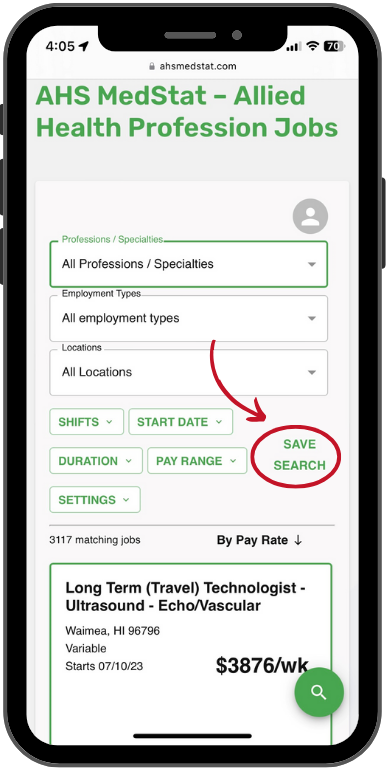If you’re looking for allied health jobs in your specialty, it’s important to consider whether you want staff positions or travel positions. Both come with their pros and cons, and there’s no one-size-fits-all approach for every person. In this blog, we’ll discuss some things to know about the differences between staff and travel allied health jobs and what to consider so you can choose the option that’s best for you.
Options for Allied Health Jobs: Travel or Staff
If you’re an allied health professional, then you can choose to either travel or take a staff job. If you’re not sure what the difference is, here are some basic differences between the two:
Travel Allied Health Jobs
Travel allied health jobs are actually temporary positions. Travelers work with medical staffing agencies to find several travel jobs each year. These jobs are meant to provide staffing solutions when there are gaps at facilities, like if someone leaves their job or needs to take leave. In these cases, the facility might not have enough people or have enough time to hire a new professional to fill in for that person. That’s where travelers come in. They fill in while the facility finds more permanent arrangements. Traveling professionals often take allied health jobs all over the country, using it as a way to travel and gain experience. It also comes with many perks beyond the adventure.

Staff Allied Health Jobs
Staff allied health jobs, also known as permanent jobs, are where you join a facility as part of the permanent staff. You work in the same facility long-term and often work your way up to more senior positions. There are many advantages to taking staff jobs as an allied health professional as well, like the extra stability.
Pros and Cons of Travel Allied Health Jobs
Like any career choice, there are many pros and cons to becoming a traveling allied health professional. The good news is that practically anyone can be a traveling professional, so whether you’re looking for surgical tech jobs, respiratory therapist jobs, or physical therapist assistant jobs, you can likely become a traveler, since so many facilities deal with unexpected staffing gaps. Here are some pros and cons to think about before taking traveling jobs as an allied health pro:
Pro: The Pay
Because travelers are filling in where they’re needed most and often traveling a long ways to do so, they often make much more than their staff counterparts. Traveling allied health jobs pay well in both salary as well as other parts of the compensation package, like tax-free stipends for housing and travel as well as benefits like medical insurance and 401K savings plans.
Pro: No Workplace Drama
Since you take temporary allied health jobs as a traveler, there’s a lot less exposure to the drama that takes part in the workplace. You’re always the new kid in town, so you’re less likely to get sucked into the intrigues between staff professionals.
Pro: Travel and Flexibility
Another reason to become a traveler is because you get to see different places and you get more freedom over your career. You can go anywhere you want in the country and you are in complete control over which assignments you take.
Pro: No Time Off Requests and Approval Process
At a staff job, you have to request time off and get it approved by the scheduler any time you want some time off for the holidays or a vacation. As a traveler, however, you can simply take off weeks or even months in between assignments, so there’s no process or potential of denial when you want some time to explore or spend time with family.
Con: Short Orientations
One drawback as a traveler is that you have short orientation times. You’re expected to get acclimated quickly because you’re filling in to prevent short-staffing. Orientation for travel allied health jobs can be as short as just a day or two, and after that you’re expected to be on the floor providing patient care.
Con: No PTO
While you don’t have to ask for time off, you also usually don’t get any PTO as a traveler. Therefore, it’s something you will need to think about before you take a vacation after every assignment.
Con: Pay Varies by Assignment
While pay for travel allied health professionals is often higher than staff positions of the same type, the pay isn’t always the same. Pay rates change for each assignment based on many things, including geography and the facility. Therefore, you’ll have to keep this in mind. One thing that can help is talking to your recruiter about your minimum salary needs so you only see assignments that will be enough to pay your bills and hit your financial goals.
Con: Credentialing and Taxes in Every State You Practice In
Different states have different rules, so travelers often find themselves needing to juggle credentials and taxes for every state they practice in. This means getting credentials like licensure in order before your assignment starts. It also means you likely have to file state taxes in every state you practice at the end of the year (but don’t worry, you likely won’t pay any more than you would otherwise).
Pros and Cons of Permanent Allied Health Jobs
Before choosing a permanent position, it’s also important to weigh the pros and cons. Here are some pros and cons of staff allied health jobs:
Pro: Stable Pay Rates
With a permanent staff position, pay rates stay the same unless you receive a raise, bonus, or demotion. This makes budgeting and accounting a little easier because you know what to expect from every paycheck.
Pro: Longer Orientation Periods
Also, when you choose a staff position, usually you get a longer orientation period to adjust. Some professionals even get a week or two of orientation to get acclimated to things like facility policies and EMR systems.
Pro: PTO
Most permanent allied health professionals also accrue PTO as they work. This means you can take time off during the year and receive your same pay. While you generally have to get this time off approved by a manager or scheduler, it is certainly a perk.
Pro: Seniority
When you work at a facility for a while, you also get to earn seniority. This can help in many ways. In fact, seniority often allows you better selection of things like shift types in many facilities. Being able to build seniority with the same facility can, therefore, be helpful.
Con: Lower Pay
However, staff professionals often make less than travel professionals. They also don’t get any stipends for things like housing and meals. Therefore, the overall compensation may be much lower until you can work your way up into higher roles in the same facility.
Con: Workplace Politics
Practically every workplace has drama and politics, and healthcare facilities are no different. Permanent staff are often exposed to this a lot more than travelers who are only there for a short time. Therefore, this is also something to consider.
Medical Staffing Solutions from AHS MedStat
Our team at AHS MedStat is your trusted staffing agency for allied health professionals. We help traveling allied health pros find assignments that perfectly match them. Our recruiters work with you to understand your goals and needs and find you the right assignments so you can make a difference daily. Get in touch with our recruiters or browse our job board today to get started.


